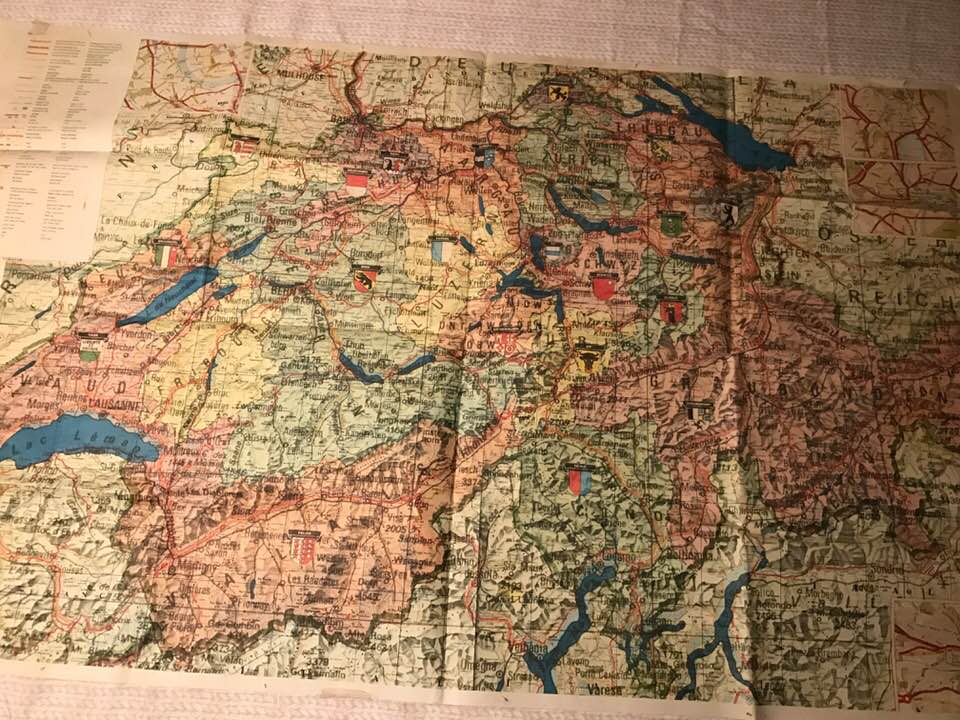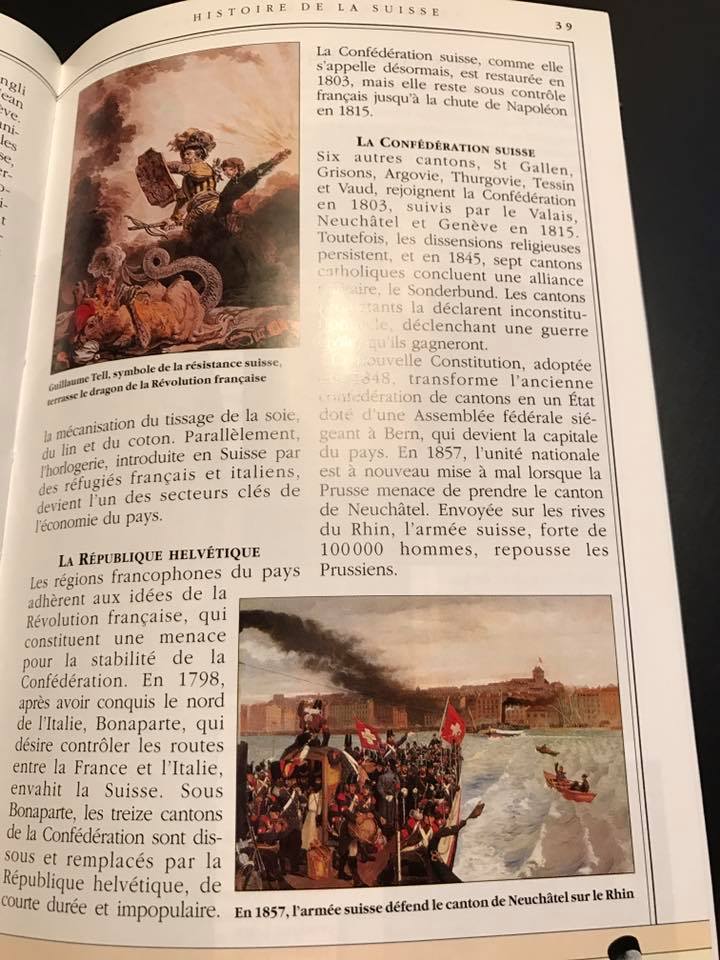
Si vis pacem para bellum! If you want peace prepare for war!
Svizzeri armatissimi et libertissimi! Machiavelli said that 500 years ago. He meant to say that the Swiss owe their liberty to their arms!
If Hitler had invaded Switzerland and implemented Operation Tannenbaum, Germany would have paid, according to the estimates of historians like S. Halbrook, a “high price.” Now the OKH (Oberkommando Heer) aka German High Command planned to use between 300-500,000 troops.

Given that at the height of Henri Guisan’s mobilization, the Swiss Army numbered 600,000 soldiers for a population of 4,000,000, and given the mountainous terrain that obstructed any form of modern warfare, rendering blitzkrieg all but impossible outside the Plateau, it is safe to say that the German Army casualties would have numbered in the 200 k range.
An interesting fact is that the Swiss don’t have the military rank of general in peace time. This is a time honoured tradition liked to their egalitarian ethos. When European wars start, the Federal Council puts to vote a few names of meritorious colonels and the name yielding the most votes is appointed General of the Swiss Armed Forces for the duration of the war.

Between late August 1939 and 1945, Henri Guisan had the privilege, honour and difficult task to be the leader of Swiss resistance.
This scenario was anticipated by the German High Command, and after careful consideration of the intrinsic fighting qualities and ethos of the Swiss citizen soldiery and their precision weapons and planned fire zones, the Germans decided to postpone Operation Tannenbaum.

Now, it is clear that in a protracted war, the Swiss would have had to yield the field, as the Finns eventually did before the Soviets. But it would have taken more than just a few months, during which the value of the Gotthard passes would have been obliterated by the Swiss.
Germany stood more to gain financially (Swiss Franc was a neutral reserve currency), industrially (Swiss industrial output) and tactically (sealed trains of German and Italian soldiers being transferred via the Gotthard) by biding their time.
At the same time the Swiss knew how to drive a hard bargain, and secure their raw materials and independence in the process.
As it happens, there is something to be said about a country where politicians come from the people, and who when the hour of need came advised the populace to ignore any order to capitulate that might ever come from Bern. This in a time when Europeans were bowing down to Hitler and Stalin and Mussolini.
A standing anecdote from before WW1, when Switzerland had been caught really, but really unprepared by the conflagration, recounted how the German Kaiser Wilhelm II, visited Swizerland, witnessing the 1911 war games of the Swiss militia.
He remarked to the Swiss General Staff that although the Swiss army was well prepared, it was trumped in size by the German army. The Kaiser said something along the lines of “What can your 500,000 soldiers do if we sent over 1,000,000 German infantry?” To this, a Swiss colonel replied: “Shoot twice and go home, your Majesty!” Needless to say the Kaiser was livid.

The Swiss army trains its soldiers to shoot at silhouettes at 400 m +. Marksmanship is taken seriously in a country where every corner is plotted and recorded on military maps, and where all roads are mined to blow, all gas stations are protected and camouflaged against air attacks, and where when you buy a house, you are obligated by law to build or pay for an atomic bunker to be built.

It is true that most of these protections were not in place in 1939. However, Switzerland was better prepared than in 1914, and despite the fact that Switzerland was not entirely immune to German attacks, the Swiss hedgehog would have caused grave wounds to the German behemoth. This is exactly why the German High Command paused to think before attacking the Swiss Confederation.
Even after World War 2, the Swiss have continued to reinforce their passive defense, requiring all new dwellings to be fitted with anti-nuclear bunker.
According to this 2009 article http://www.swissinfo.ch/eng/bunkers-for-all/995134 – there was still a legal obligation to pay for a bunker when building a new dwelling or disburse the funds to pay for a public bunker if the home owner does not want to have a bunker under his home. Those of you who are privy to info on the subject, please feel free to contact me. I will evaluate it and post it here with your name credited if you’ll allow it.
According to another article, military bunkers part of the WW2 Reduit strategy are slated to be disaffected in order to save CHF1 billion.
http://www.swissinfo.ch/eng/military-bunkers-face-their-waterloo/28606254
The best example of Swiss patriotic spirit and high sense of duty, a 1964-film made for Expo ’64 that nailed down that essential Swiss quality, which made the Vicomte de Valmont in Liaisons Dangereuses hire a Swiss doorkeeper, namely a passion to ruthlessly defend their hard-earned livelihood.
Even today thanks to associations like ProTell, the Swiss consider guns as tools to deter would-be aggressors from compromising Swiss armed neutrality.

These are all reasons why Hitler did not mess with the Swiss. Besides, the Swiss have always been keen negotiators and that is how they emerged unscathed from the conflagrations that engulfed Europe in the last 173 years.

The Swiss were caught with their pants down once in 1798 when the French Directorate invaded their country. They swore never to let that happen if they could do something about it. So they armed themselves and they added the adjective “armed” to Europe’s guarantee of neutrality.
During the Neuchâtel crisis of 1856–57, when the King of Prussia threatened to invade Switzerland to re-establish himself as the sovereign of Canton Neuchâtel, the Confederation prepared for war. Switzerland military challenged Prussia to invade but the King of Prussia stepped away from the gambit. As a matter of fact, during the crisis, the Swiss were deemed by Bavarian bankers to be a better risk than the King of Prussia. So, before the war even started, the Swiss borrowed 40 million Swiss franks from some concerned Bavarian bankers.
To me this looks as though southern Germany was “banking” on the Swiss thwarting old King Frederick William’s Prussian army back to Berlin, where it belonged.



The Swiss quickly mobilized and were ready to preempt the Prussian attack by drawing offensive plans out of Basel and Schaffhausen, on the Rhine, away from Neuchâtel. When confronted by 100,000 determined Swiss, the Prussians backed down. So there you have it folks, the history of a people ready to defend their sovereignty and willing to take the fight to the enemy to prove it!
Click to access neuchatelaffair00rick.pdf

To this day the Swiss army has the best military schools in Europe and Switzerland is the country best prepared for war.

